We were cleaning up the office here at Wiedlin Headquarters and found this Q&A with Jane about songwriting. We’re not sure where it’s from but we thought you’d enjoy it. 🙂
Q&A with Jane!
Jane Wiedlin rocketed to stardom in the early ’80s as rhythm guitarist for the Go-Go’s, the most successful all-female group to emerge from that era’s new wave/punk-pop explosion. On record, stage and small screen, Wiedlin wielded her guitar with playful abandon, not to mention solid rhythm chops.After a few solo outings and some film/television work, she was instrumental (pardon the pun) in reconvening the Go-Go’s, and the group continues to enjoy popular and successful tours and recordings. Further, she crossed songwriting genre lines by co-writing down-under country sensation Keith Urban’s first number-one hit, “But For the Grace Of God†in 2000. More recently, she’s singing in a new jazz oufit, Jane Wiedlin and the Downtown Sensation, interpreting the great American songbook and paying tribute to great ladies of song such as Ella Fitzgerald, Judy Garland and Peggy Lee.
Clearly, when it comes to songwriting and craft, Wiedlin knows a thing or two about a thing or two. In addition to her ongoing work in the Go-Go’s, as her own website (www.janewiedlin.com) puts it, she is “always busy writing songs.â€
You’re widely known as a Go-Go, but you penned a big hit for country star Keith Urban. As a songwriter, how does it feel to be able to cross genre lines?
Well, being creative is not a rigid thing, at least for me. I find if I’m not writing songs, I’ll be doing something else like writing scripts, or books, or just sitting around dreaming up wacky ideas for the fun of it. So, because I believe ALL creativity springs from the same place, I don’t think it’s any harder when it comes to making different genres of music. As far as “insider rules†(and there are a lot in country music) Keith knew all that and I just followed his lead.You explore a whole other school of songwriting in the Downtown Sensation by interpreting classic American jazz songs. Has doing that affected your own songwriting ideas and processes? If so, how?
The songs I’m singing in THE DOWNTOWN SENSATION are mostly ones that I heard as a teenager. One of the best things about the beginning days of punk rock is the punk community that I was a part of was interested in many differnet kinds of music, so I got exposed to a lot of really great songs. It only felt natural to start singing them, and interest in 40’s music has never been stronger than it is currently. I’m in love with the intelligence of the writing, and especially with people like Cole Porter, the amazingly clever lyrics. I know I can never sing like Ella or write like Cole, but just keeping these songs alive is rewarding in itself. I’ve always strived for smart songwriting, and it’s probably because of my early exposure to the greats.Let’s say you have an idea that could possibly work as a rock song, a country song or maybe an R&B song. How do you choose the kind of “treatment†to give a song?
Mostly if I’m writing outside my own genre (pop/rock) it is for something specific, so the style is pre-determined. To be honest, I don’t think I’d just go and write an R&B or country song arbitrarily, there is normally a project driving my ideas.When you write a song, do you start with a title (or some other lyrical idea), or do you start with a musical idea, like a riff or a chord progression? Or does it vary?
I love starting from a title but I am open to anything. My ideas spring from lyrics and story ideas, and the way my brain works, the music comes second. Most of my songwriting friends say the opposite, by the way, but I’ve always felt like a lyricist at heart. Having said that, I am perfectly capable of writing music and normally do!Are good songs the result of sitting down and cranking them out, or do they just sort of “happen†on their own? Or is it a combination of both?
The initial inspiration for songs “just happensâ€. That’s the “Art†part. But if I don’t take time to sit down and do the work, they never become actualized. That’s the “Craft†part. I love to collaborate because you kind of double your chances of being both ARTsy and CRAFTsy!What inspires you?
Things that happen to me and the people around me, mostly. Strong emotions like love, hate, and despair are always best! Once in a while a current event will trigger a song. Those can get tricky because it’s hard to write something that doesn’t sound preachy and also make something that will be timeless and not just work in the present.For you, is there more than one way to write a song, or do you rely on one process that has more or less always worked for you?
The easiest way for me, the most comfortable, is to collaborate with someone who is very strong in chord progressions. That way, they can concentrate on that, I can concentrate on lyrics, which come easy to me, and we can collaborate on melody, which is obviously dictated by chords and words! I’ve written hundreds of songs this way and it is “my old standbyâ€. I recently embarked on a project where I was responsible for 100% of the songs, so it was a chance for me to not be a creature of habit and really stretch myself.Any thoughts on the chemistry and intricacies of collaborative songwriting?
It takes a pretty specific person to make collaboration work. I need someone with very strong ideas, who is willing to tell the truth in a diplomatic but forthright way, and is positive and goal-oriented. I like to feel comfortable and unselfconscious about throwing ideas out there, knowing I trust their judgement whether they approve or disapprove. It’s just as hard to work with someone who claims they love ALL your ideas, as it is to work with people who don’t like anything but can’t offer up anything better!!I don’t like to walk away from a session with an unfinished song. It’s hard to pick up on them later. I find just diving into the inspiration and calling up your craftsmanship with the right collaborator makes it almost a sure bet of writing something decent and finishing at least the rough sketch in one session. Most of my songwriting sessions are 2 to 4 hours by the way. More than that and you get burnt out.
What and who were your earliest songwriting influences and inspirations?
The Beatles, David Bowie and Bryan Ferry, for sure. Punk groups like The Buzzcocks. Cole Porter, the Gershwins, Richard Rodgers.Do you have to be an accomplished musician to write a song?
Not at all. I’m a very rudimentary guitarist. Sometimes knowing too much theory can actually hamper your inspiration, but having said that, I do envy people who know more than ten or twelve chords!!!How does it feel when you’ve written a song that you’re especially happy with and confident in?
The number one best feeling in the world. I wouldn’t trade it for anything. Seriously!! It’s what keeps me coming back for more even when I’m thoroughly disgusted with the music business!Any other thoughts on songwriting?
I used to be very egalitarian about writing. I’d say “Anyone can write, you’re just choosing not toâ€. Now I’d amend that to say “Anyone can write, but you are truly blessed if you can write a GOOD song!â€

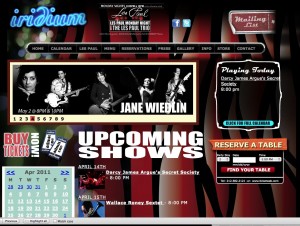
 The Go-Go’s rock and yet, we aren’t included in the Women Who Rock exhibit in
The Go-Go’s rock and yet, we aren’t included in the Women Who Rock exhibit in 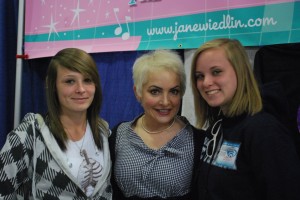
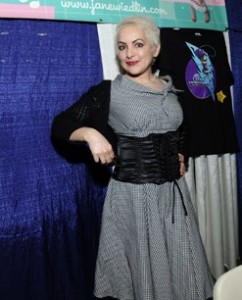
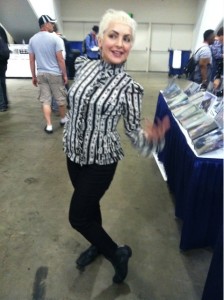
 New update from Jane.
New update from Jane.


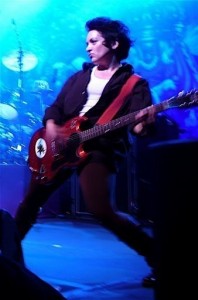 On May 2nd Jane will be sitting in with the
On May 2nd Jane will be sitting in with the 